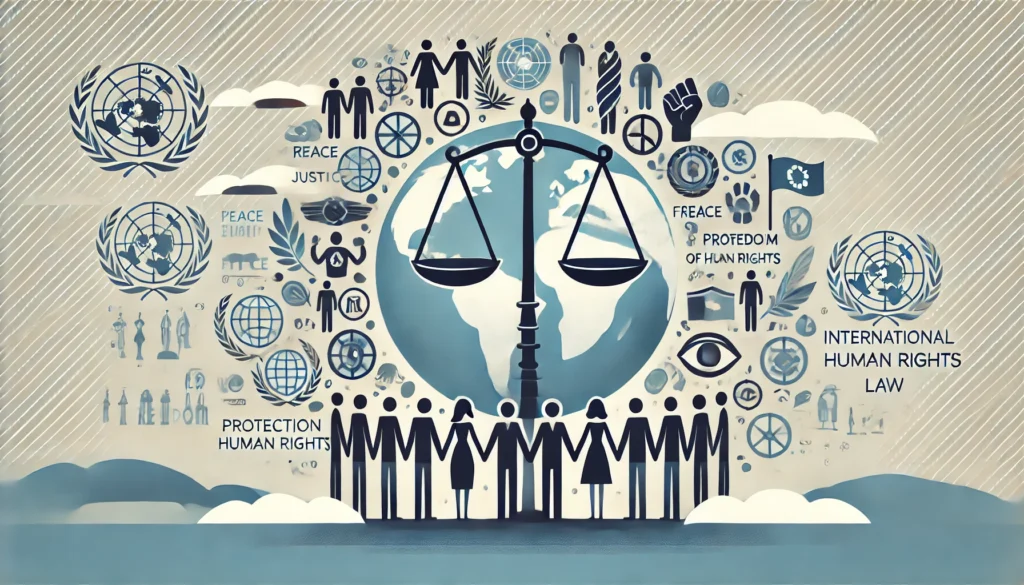Published on 22nd July 2025
Authored By: Ojasvi Sharma
Banasthali Vidyapith
Introduction
World War II, the conflict which involved nearly every country and resulted in the death of an estimated 60 – 80 million people. The international committee was now committed to ensuring that the crime of genocide would never go “unpunished”. This is how “Prevention and Punishment of the Crime of Genocide”[1] an international treaty was adopted in the year 1948 to ensure that such events are never repeated. It established legal framework for holding accountability. But more than 70 years later the world is still witnessing the horrific crimes as from the widespread persecution of Rohingya Muslim in Myanmar to the recent destruction and casualties in Gaza, which raises serious concern about the effectiveness and the fairness of the international justice system
The aim of this article is to international law on genocide and through a light on the current cases of Gaza and Myanmar and evaluate the challenges in establishing legal accountability
Understanding Genocide under International Law
The legal definition of genocide is given under Article II of convention on prevention and punishment for crime of genocide which states the following: In the present Convention, genocide means any of the following acts committed with intent to destroy, in whole or in part, a national, ethnical, racial or religious group, as such:
- Killing members of the group;
- Causing serious bodily or mental harm to members of the group;
- Deliberately inflicting on the group conditions of life calculated to bring about its physical destruction in whole or in part;
- Imposing measures intended to prevent births within the group;
- Forcibly transferring children of the group to another group.[2]
It is not just killing of people during war or conflict – it is when they try to destroy the whole community based on who they are. It is done on purpose because they belong to a particular group, religion, race, ethnicity, or nationality, with the goal to destroy that group either completely or partially.
the element of crime comprises of two elements:
- Mens Rea (mental element): a dolus specialis to destroy, in whole or in part
- Actus Reus (physical element): the acts listed in the Article II must be committed against the group
The presence of dolus specialis is what distinguishes genocide from other international crime such as war crimes or crimes against humanity.
Legal mechanism for accountability
The mechanisms that exist that are available to hold individual and state accountable for genocide are:
International Court of Justice (ICJ): it was established as a way of settling disputes between countries. The ICJ court is not a supreme court to which national court can turn; it can only hear those disputes which are requested to do so by one or more states. One of the prominent examples is the case brought by a South Africa against Israel where it was alleged by South Africa that Israel’s action constituted genocide in Gaza. South Africa contends that “acts and omissions by Israel…are genocidal in character, as they are committed with the requisite specific intent…to destroy Palestinians in Gaza as a part of the broader Palestinian national, racial and ethnical group”.
International criminal court (ICC): it is an international court established to prosecute individual for the most serious crimes that concerns the international community such as genocide, crimes against humanity and war crimes. Some notable cases include the case of former Sudanese President Omar al-Bashir who was indicted by ICC for genocide and other crimes committed. The ICC plays a crucial role in ensuring individual criminal accountability
Universal jurisdiction: under this principle the courts are allowed to prosecute certain cases irrespective of where they were committed or the nationality of the accused or victim. This principle is based on the idea that some crimes are so serious that they end up affection the whole international community. Germany is one of the leading examples. It uses universal jurisdiction to prosecute individuals involved in atrocities committed during Syrian civil war. This help to close the accountability gaps where the international court and the domestic courts are not able to intervene.
Case studies
Myanmar and the Rohingya genocide
In 2017, Myanmar’s military launched a brutal campaign against Rohingya Muslim population in Rakhine state. This included mass killings, sexual violence and displacement of more than 700,00 Rohingya in neighboring countries[3]. The investigation conducted by the UN concluded that these acts may constitute genocide, leading to legal action[4]. The case study has become a key example of how international legal mechanisms respond to allegations of genocide.
In 2019, The Gambia, on behalf of the organization of Islamic cooperation, brought a case against Myanmar at international criminal court of justice alleging violation of genocide convention. The ICJ accepted the jurisdiction and issued provisional measure in 2020, ordering the Myanmar government to prevent genocide acts. This was a significant movement and showed how one state an bring an action against another state for genocide. Alongside this the international court launched an investigation focusing on individual criminal responsibility
Gaza/Israel Conflict
The 2023-2024 escalation in Gaza also triggered legal scrutiny. In December 2023, south Africa instituted legal proceedings alleging violations of the Genocide Convention related to the military actions in Gaza[5]. In January 2024, the ICJ issued provisional measures requiring Israel to take steps to prevent further acts and facilitate humanitarian aid[6].
Simultaneously the ICC continued its broader investigation into the situation of Palestine. ICC prosecutor Karim Khan has applied for the arrest warrants against senior Israeli and Hamas officials, citing alleged war crimes and crimes against humanity-with some charges potentially amounting to genocide[7]
These case studies show the important role that international legal institution play in confronting genocide in real time, despite the political complexity of such conflicts.
Challenges of Justice
Despite the existence of legal mechanisms, the pursuit of justice on genocide case faces numerous challenges. One of the most persistent obstacles is political interference, particularly from powerful states. For example, the United nation Security council (UNSC) has authority to refer cases to ICC. However, the veto power held by the five permanent members often results in a political deadlock. In 2014, a resolution seeking to refer the situation in Syria to ICC was vetoed by Russia and China despite overwhelming evidences of mass atrocities[8]. This highlights how geopolitical interest often overrides the pursuit of justice, leaving victim without recourse.
Another challenge is the lack of enforcement mechanisms. The ICC does not have its own police and often depend on its member state to execute its warrant this resulted in failure’s to detain individuals such as Omar al-Bashir, the former president of Sudan who was indicted by the ICC in 2009 for genocide in Darfur but continued to travel internationally without being arrested[9]. Such non compliance by the state erodes the authority and credibility of the ICC
Another issue lies in the difficulty of proving criminal intent. Under Article II of the genocide Convention, genocide requires the presence of specific intent (dolus specialis) to destroy a protected group “in whole or in part”[10]. Establishing the intent is very complex especially in the absence of direct evidence such as official orders or public statement. Prosecutor often must rely on circumstantial evidence, making conviction more difficult to secure11.
Conclusion
Even after the legal framework and the mechanisms to enforce justice, genocide still remains one of the gravest crimes under international law, threatening the very fabric of human civilization
The ICJ plays an important role in attributing state responsibility for genocide, as seen in the Gambia v. Myanmar and South Africa v. Israel where provisional measures were issued to prevent further atrocities[11]. Meanwhile the ICC targets individual accountability, ensuring that high ranking official cannot act without impunity[12]. The principle of Universal jurisdiction, further expands the reach of justice beyond the conventional boundaries.
To strengthen accountability. Reforms are needed-such as limiting UNSC vetoes in mass atrocity cases, enhancing ICC cooperation mechanisms and investing in rapid response investigatory bodies. Ultimately, international justice for genocide is crucial not only for punishment but also for deterring future atrocities and upholding dignity of affected community
References
[1] Convention on the Prevention and Punishment of the Crime of Genocide, G.A. Res. 260 A (III), U.N. GAOR, 3d Sess., Supp. No. 20, U.N. Doc. A/810, at 174 (Dec. 9, 1948), entered into force Jan. 12, 1951.
[2] Convention on the Prevention and Punishment of the Crime of Genocide art. II, Dec. 9, 1948, 78 U.N.T.S. 277.
[3] United Nations High Commissioner for Refugees, Rohingya Emergency, UNHCR, https://www.unhcr.org/rohingya-emergency.html.
[4] U.N. Human Rights Council, Report of the Independent International Fact-Finding Mission on Myanmar, U.N.
Doc. A/HRC/39/64 (Sept. 12, 2018).
[5] Application of the Convention on the Prevention and Punishment of the Crime of Genocide (S. Afr. v. Isr.), Application Instituting Proceedings, I.C.J. (Dec. 29, 2023), https://www.icj-cij.org/case/192.
[6] Application of the Convention on the Prevention and Punishment of the Crime of Genocide (S. Afr. v. Isr.), Application Instituting Proceedings, I.C.J. (Dec. 29, 2023), https://www.icj-cij.org/case/192.
[7] Application of the Convention on the Prevention and Punishment of the Crime of Genocide (S. Afr. v. Isr.), Provisional Measures, Order, 2024 I.C.J. Rep. ___ (Jan. 26), https://www.icj-cij.org/case/192/orders.
[8] Rome Statute of the International Criminal Court art. 13(b), July 17, 1998, 2187 U.N.T.S. 90 Press Release,
U.N. Security Council, Referral of Syria to International Criminal Court Fails as Negative Votes Prevent Security Council from Adopting Draft Resolution, U.N. Press Release SC/11407 (May 22, 2014), https://press.un.org/en/2014/sc11407.doc.htm.
[9] Marlise Simons & Neil MacFarquhar, Despite Warrant, Sudan’s Leader Travels to Saudi Arabia, N.Y. Times (Mar. 27, 2015), https://www.nytimes.com/2015/03/28/world/africa/sudan–president–omar–hassan–al–bashir–saudiarabia.html.
[10] Convention on the Prevention and Punishment of the Crime of Genocide art. II, Dec. 9, 1948, 78 U.N.T.S. 277. 11 William A. Schabas, Genocide in International Law: The Crime of Crimes 243–48 (2d ed. 2009).
[11] Application of the Convention on the Prevention and Punishment of the Crime of Genocide (Gam. v. Myan.), Provisional Measures, 2020 I.C.J. Rep. 3 (Jan. 23); S. Afr. v. Isr., Provisional Measures, 2024 I.C.J. Rep. ___ (Jan. 26).
[12] Rome Statute of the International Criminal Court art. 25, July 17, 1998, 2187 U.N.T.S. 90.




